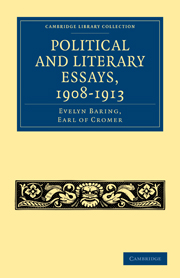Book contents
- Frontmatter
- PREFACE
- Contents
- “THE EDINBURGH REVIEW”
- “THE QUARTERLY REVIEW”
- “THE NINETEENTH CENTURY AND AFTER”
- “THE SPECTATOR”
- VIII DISRAELI
- IX RUSSIAN ROMANCE
- X THE WRITING OF HISTORY
- XI THE GREEK ANTHOLOGY
- XII LORD MILNER AND PARTY
- XIII THE FRENCH IN ALGERIA
- XIV THE OTTOMAN EMPIRE
- XV WELLINGTONIANA
- XVI BURMA
- XVII A PSEUDO-HERO OF THE REVOLUTION
- XVIII THE FUTURE OF THE CLASSICS
- XIX AN INDIAN IDEALIST
- XX THE FISCAL QUESTION IN INDIA
- XXI ROME AND MUNICIPAL GOVERNMENT
- XXII A ROYAL PHILOSOPHER
- XXIII ANCIENT ART AND RITUAL
- XXIV PORTUGUESE SLAVERY
- XXV ENGLAND AND ISLAM
- XXVI SOME INDIAN PROBLEMS
- XXVII THE NAPOLEON OF TAINE
- XXVIII SONGS, PATRIOTIC AND NATIONAL
- XXIX SONGS, NAVAL AND MILITARY
- INDEX
XIX - AN INDIAN IDEALIST
Published online by Cambridge University Press: 07 September 2011
- Frontmatter
- PREFACE
- Contents
- “THE EDINBURGH REVIEW”
- “THE QUARTERLY REVIEW”
- “THE NINETEENTH CENTURY AND AFTER”
- “THE SPECTATOR”
- VIII DISRAELI
- IX RUSSIAN ROMANCE
- X THE WRITING OF HISTORY
- XI THE GREEK ANTHOLOGY
- XII LORD MILNER AND PARTY
- XIII THE FRENCH IN ALGERIA
- XIV THE OTTOMAN EMPIRE
- XV WELLINGTONIANA
- XVI BURMA
- XVII A PSEUDO-HERO OF THE REVOLUTION
- XVIII THE FUTURE OF THE CLASSICS
- XIX AN INDIAN IDEALIST
- XX THE FISCAL QUESTION IN INDIA
- XXI ROME AND MUNICIPAL GOVERNMENT
- XXII A ROYAL PHILOSOPHER
- XXIII ANCIENT ART AND RITUAL
- XXIV PORTUGUESE SLAVERY
- XXV ENGLAND AND ISLAM
- XXVI SOME INDIAN PROBLEMS
- XXVII THE NAPOLEON OF TAINE
- XXVIII SONGS, PATRIOTIC AND NATIONAL
- XXIX SONGS, NAVAL AND MILITARY
- INDEX
Summary
“The Spectator,” July 12, 1913
Amidst the jumble of political shibboleths, mainly drawn from the vocabulary of extreme Radical sentimentalists, which Mr. Mallik supplies to his readers in rich abundance, two may be selected which give the keynote to his opinions. The first, which is inscribed on the title-page, is St. Paul's statement to the Athenians that all nations of men are of one blood. The second, which occurs towards the close of his work, is that “sane Imperialism is political Idealism.” Both statements are paradoxical. Both contain a germ of truth. In both cases an extreme application of the principle involved would lead to dire consequences. The first aphorism leads us to the unquestionably sound conclusion that Newton, equally with a pygmy from the forests of Central Africa, was a human being. It does not take us much further. The second aphorism bids us remember that the statesman who is incapable of conceiving and attempting to realise an ideal is a mere empiricist, but it omits to mention that if this same statesman, in pursuit of his ideal, neglects all his facts and allows himself to become an inhabitant of a political Cloud Cuckoo-land, he will certainly ruin his own reputation, and may not improbably inflict very great injury upon the country and people which form the subject of his crude experiments.
- Type
- Chapter
- Information
- Political and Literary Essays, 1908–1913 , pp. 317 - 326Publisher: Cambridge University PressPrint publication year: 2010First published in: 1913

